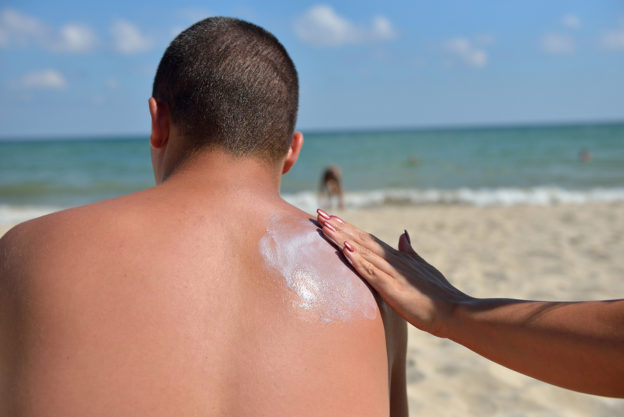By David Blyweiss, M.D., Advanced Natural Wellness
June 16, 2017
- Exposed! Not all sunscreens are created equal
- Is your sunscreen robbing you of vitamin D… or giving you cancer?
- The only kind of sun blocker you should ever buy
You would think that vitamin D deficiency would be unheard of down here in South Florida. After all, this is the sunshine state. And where there is plenty of sunshine, there should be plenty of vitamin D.
Still, vitamin D insufficiency is just as common down here as it is in any other state. I’ll place that blame squarely on the shoulders of our fear of the sun – and over reliance on sunscreen protection.
You see, when your skin is exposed to ultraviolet rays, it converts (via the kidneys and liver) a form of cholesterol into vitamin D3. But if you slather on the sunscreen before heading outdoors, this conversion process can’t take place.
Now, here’s the thing. Right now sunscreen season is in full swing all across the U.S. You can’t walk into a drug store, grocery store or big discount chain without running into a giant display of sunscreen products. Some of them are inexpensive. Others have price tags that are staggering.
But no matter which one you choose, you may be doing yourself a disservice.
Open your arteries, improve blood flow for a new health miracle...
Did you know your circulatory system has over 60,000 miles of arteries, veins and other blood vessels, if stretched end to end?
But as you age, your blood vessels undergo changes, which may cause them to stiffen, thicken and get clogged.
GOOD NEWS! Doctors have now identified a “Miracle Molecule” inside your arteries that helps OPEN your arteries and IMPROVE blood flow.
It’s what Dr. Valentin Fuster calls it, "One of the most important discoveries in the history of cardiovascular medicine."To you, that means...
- Healthy blood pressure
- Sharper mind and memory
- Skyrocketing energy and muscular strength
- Increased pleasure and passion in the bedroom
- Improved circulation to every cell and organ in your body
Go here to discover a new natural way to significantly boost the levels of this miracle molecule in YOUR body NOW!
Is Your Sunscreen Robbing You of Vitamin D… or Giving You Cancer?
When you don’t have enough vitamin D, all sorts of things can go haywire. Depleted levels of vitamin D are associated with…
- Several deadly forms of cancer, including cancers of the colon, prostate, breast… and skin melanomas.
- An increased chance of dementia and Alzheimer’s. A moderate deficiency could increase your risk by more than 50%. Severe deficiencies can double the risk.
- Higher odds of developing heart disease, diabetes, depression and fibromyalgia.
And guess what? Not only does sunscreen prevent you from producing plenty of much-needed vitamin D that protects you from theses ailments… most of them contain ingredients that are likely more harmful to your skin than the sun itself.
In fact, your sunscreen could actually increase your risk of skin cancer more than exposure to the sun would.
Many sunscreen products still contain retinyl palmitate. As a form of vitamin A, you would think this would be good for you. However, when applied to the skin before going out into the sun, it can actually speed up the development of malignant cancer cells when exposed to UV rays.
The large majority of sunscreens also include oxybenzone as a key sun-blocking ingredient. When this compound is exposed to the sun it appears to have endocrine disrupting activities – meaning it disrupts the healthy balance of your hormones.
Other chemicals in sunscreens that have a similar effect are parabens (i.e., methylparaben, ethylparaben) and pthalates, which are usually identified by the word “fragrance”.
Are You Suffering From...
- Love handles and a pot belly
- Romance that isn't what it used to
- Forgetfulness and inattention
- Low (or no) strength and endurance
- A sex drive that's shifted into neutral...or worse
If so...you may have Mature Male Burnout. Click here to discover more about this unique condition and what you can do about it.
Well, here’s the thing. The large majority of people – around 83% – have detectible levels of oxybenzone, parabens and pthalates in their bodies.
That’s very unfortunate, since the majority of endocrine-disrupting chemicals are associated with the development of cancers, obesity and thyroid problems. It’s best to avoid them at all costs.
The Only Kind of Sun Blocker You Should Ever Buy
Now that you’re familiar with sunscreen ingredients to avoid, let’s take a look at some of your best options…
Before applying sunscreen, take a good 15-20 minutes (longer if you have dark skin) to absorb a little sunshine and boost your vitamin D levels.
Then, instead of applying a sun blocker that contains a slew of potentially harmful ingredients, go the old fashioned route and opt for one that uses zinc oxide or titanium oxide as its base.
Unlike today’s modern sunscreens, zinc and titanium oxide don’t absorb ultraviolet light. Instead, they scatter the rays away from the skin’s surface. My only word of caution is to avoid the spray-on kind. (Not only do they offer poor coverage, but the spray-on particles can be inhaled into your lungs.) Instead, select a zinc or titanium based sunscreen that comes in lotion or cream form.
If you tend to burn easily and know you’ll be outdoors for a long period of time, take a hat and a long sleeved lightweight shirt for additional protection.
And don’t forget to take along a good pair of sunglasses that block 100% of UVA and UVB rays. These are the best protection your eyes have against the sun.
SOURCES:
van der Rhee H, et al. Is prevention of cancer by sun exposure more than just the effect of vitamin D? A systematic review of epidemiological studies. Eur J Cancer. 2013 Apr;49(6):1422-36
Littlejohns TJ, et al. Vitamin D and the risk of dementia and Alzheimer disease. Neurology. 2014 Sep 2;83(10):920-8.
Baggerly, CA, et al. Sunlight and Vitamin D: Necessary for Public Health. Journal of the American College of Nutrition. Volume 34, Issue 4, 2015.
Yilmaz R, et al. Efficacy of vitamin D replacement therapy on patients with chronic nonspecific widespread musculoskeletal pain with vitamin D deficiency. Int J Rheum Dis 2016 Nov 11. Epub 2016 Nov 11.
Planta MB. Sunscreen and melanoma: is our prevention message correct? J Am Board Fam Med. 2011 Nov-Dec;24(6):735-9.
Xia Q, et al. Photoirradiation of retinyl palmitate in ethanol with ultraviolet light–formation of photodecomposition products, reactive oxygen species, and lipid peroxides. Int J Environ Res Public Health. 2006 Jun;3(2):185-90.
NTP Technical Report on the Photococarcinogenesis Study of Retinoic Acid and Retinyl Palmitate. National Institutes of Health. 2012 Aug. NIH Publication No. 12-5910
Dewalque L, et al. Measurement of urinary biomarkers of parabens, benzophenone-3, and phthalates in a Belgian population. Biomed Res Int. 2014;2014:649314.
Diamanti-Kandarakis E, et al. Endocrine-disrupting chemicals: an Endocrine Society scientific statement. Endocr Rev. 2009 Jun;30(4):293-342.







